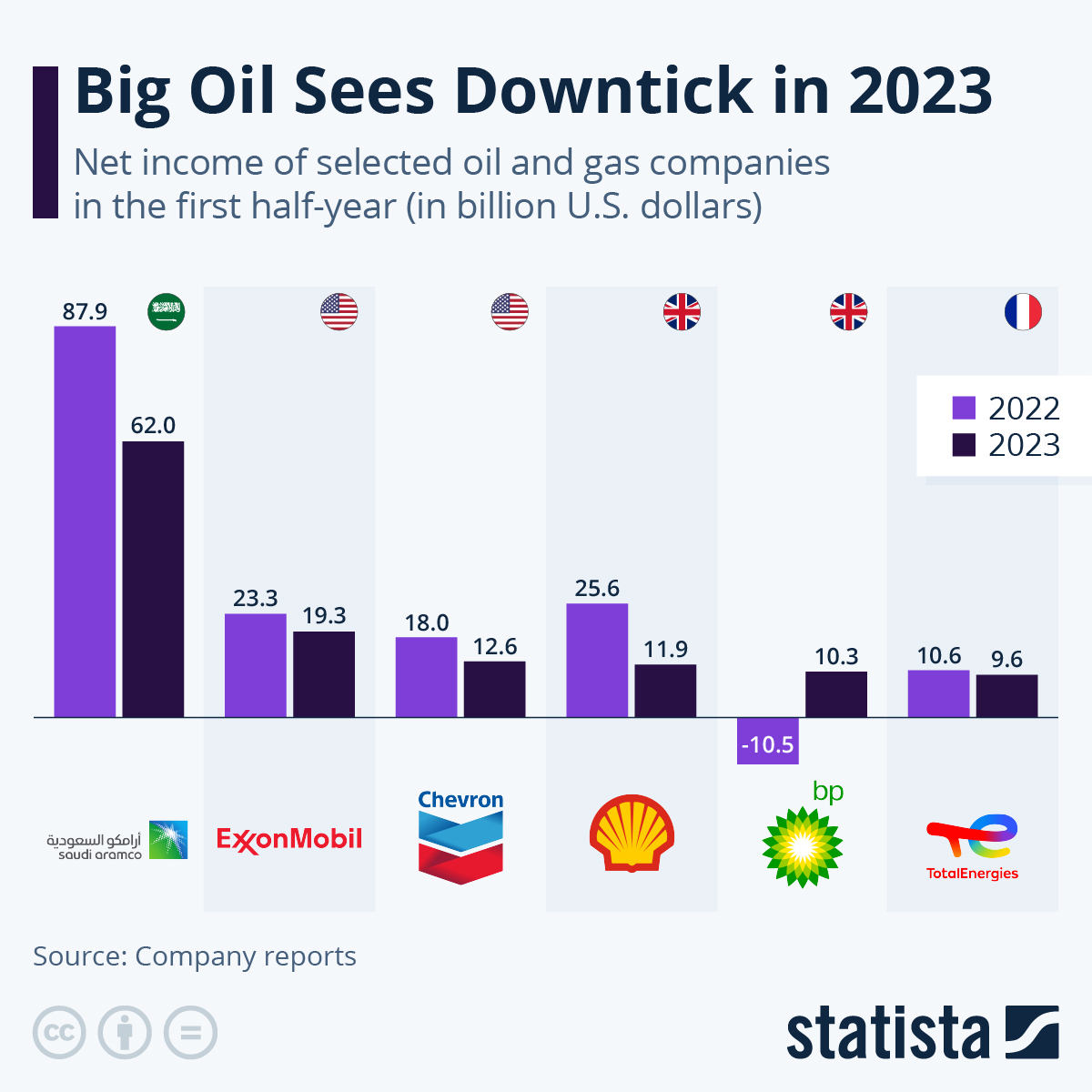List Of Oil & Gas Companies
In the ever-evolving landscape of the energy sector, oil and gas companies play a pivotal role in powering economies and fueling innovation. From industry giants with a global presence to emerging players carving out their niche, the oil and gas sector is a complex tapestry of exploration, production, and sustainability efforts. In this blog post, we will explore a comprehensive list of key oil and gas companies, highlighting their contributions to the industry, recent developments, and what sets them apart in a competitive market. Whether you're an investor, a job seeker, or simply curious about the energy landscape, this guide will provide valuable insights into the major players shaping the future of oil and gas.
Chart: Big Oil Sees Downtick In 2023
 www.statista.com
www.statista.com
The oil and gas industry is a colossal sector that fuels the global economy, providing energy resources essential for myriad applications. This article delves into a curated list of prominent oil and gas companies, highlighting their significance, operations, and contributions to the energy landscape.
At the forefront of this industry lies ExxonMobil, an American multinational that epitomizes scale and reach. With a rich history dating back to the 19th century, ExxonMobil operates across the entire hydrocarbon spectrum, engaging in exploration, production, refining, and distribution. Their technological innovations have propelled advancements in energy extraction and environmental stewardship.
Next is Royal Dutch Shell, a behemoth with a dual focus on oil and natural gas. Shell has adeptly diversified its portfolio, venturing into renewable energy sources while maintaining a stronghold in traditional fossil fuels. The company's commitment to sustainability is evident through its investment in alternative energy technologies and carbon capture initiatives.
BP (British Petroleum) is another titan within this domain, renowned for its extensive global operations. BP has made significant strides in transitioning towards a lower-carbon future, aiming to reduce its oil and gas output while amplifying its renewable energy endeavors. This pivot underscores the evolving dynamics of the energy sector, where traditional players are adapting to new paradigms.
Moreover, Chevron stands as a formidable entity, known for its integrated business model that encompasses upstream and downstream activities. Chevron's operations span numerous countries, and its investments in advanced extraction techniques, such as hydraulic fracturing, have enabled it to unlock previously inaccessible reserves, thereby augmenting its production capabilities.
In the realm of state-owned enterprises, Saudi Aramco reigns supreme. This Saudi Arabian oil giant is the largest oil producer globally, with reserves that are staggering in scale. Aramco's influence extends beyond mere production; it plays a pivotal role in shaping global oil prices and policies, making it a key player in the geopolitical landscape.
Another noteworthy mention is Gazprom, the Russian energy conglomerate that dominates the natural gas sector. Gazprom's extensive pipeline network ensures that it remains a critical supplier to Europe and beyond. The company's operations are not without controversy, often entangled in geopolitical intricacies that highlight the intersection of energy and international relations.
Turning to the North American landscape, ConocoPhillips emerges as a significant player, particularly in the exploration and production of unconventional resources. Its emphasis on technological innovation, alongside a commitment to operational excellence, positions ConocoPhillips as a leader in the competitive shale oil market.
Additionally, Eni, an Italian multinational, is recognized for its diverse energy portfolio, which includes oil, natural gas, and renewable sources. Eni's strategic partnerships and exploration activities in Africa and the Mediterranean underscore its global aspirations and commitment to sustainable practices.
Finally, TotalEnergies, formerly known as Total, has embarked on a transformative journey towards becoming a world-class player in the energy transition. The company's investments in solar, wind, and hydrogen technologies reflect its ambition to lead in the decarbonization of energy systems, aligning with global climate goals.
You Might Also Like: 69 Mimpi Melihat Orang Kawin Togel
In conclusion, the oil and gas industry is characterized by a diverse array of companies, each contributing uniquely to the energy ecosystem. From traditional giants to innovative newcomers, these entities navigate a complex landscape marked by technological advancements, regulatory challenges, and an increasing emphasis on sustainability. As the world transitions towards cleaner energy solutions, the role of these companies will undoubtedly evolve, shaping the future of energy consumption and production.
Post a Comment